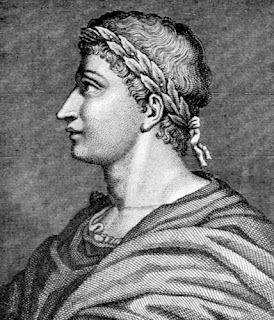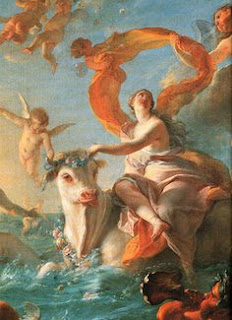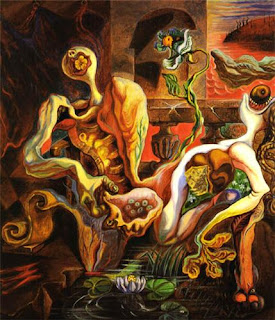Publius Ovidius Naso was born in Sulmo, east of Rome in the year 43 B.C. As a son of an upper middle class family, his father sent him to be educated in Rome to distinguish himself in a career in law or government. Ovid was known as an exemplary rhetorician and worked at minor magisterial posts before quitting his public career to pursue poetry. Immediate success followed his first published elegy and by 8 A.D., the year in which Metamorphoses was published, he was one of the foremost poets of Rome.
Category Archives: Roman Lit
Metamorphoses ~ Book XV
Book XV
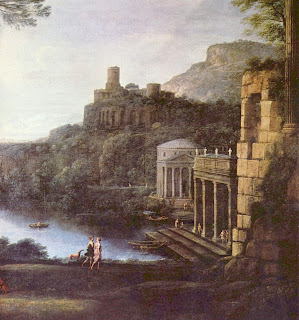 |
| Claude Lorrain source Wikimedia Commons |
Numa becomes king of Rome, and since he has cemented the laws and customs of Rome, he now decides to study the laws of nature. Leaving Cures, he travels to Croton where an elder tells him the story of the founding of the city. Hercules on his way back to Croton, stopped at Cape Lacinium. As he grazed his cattle, he pronounced a prophesy that in two generations time, a city would rise on that spot, and it came to pass. Myscelus, son of Alemon, was born, loved of the gods. One night as he slept, Hercules stood over him, commanding him to seek the distant Aesar. Myscelus found himself in a terrible conflict. It was forbidden him to leave his homeland on pain of death, yet Hercules had issued threats if he did not obey. Myscelus called out to the gods for help and their vote freed him. Reaching Aesar, he established Croton, building walls about it as Hercules commanded, founding this Greek town on Italian soil.
Metamorphoses ~ Book XIV
Book XIV
Passing the Cyclop’s fields, Messina, and that dangerous strait that separates Ausonia and Sicily, Glaucus streaks through the Tyrrhenian sea until he reaches Circe‘s palace. He tells of her of his woe and the fleet foot of Scylla who spurs his advances, but the goddess is enraged that he can only love Scylla and not her. Chanting infernal spells of Hecate, she heads for Rhegium across from Messina, polluting Scylla’s favourite pool with noxious poisons. As soon as the girl immerses herself, she sees snarling barking dogs in the water. Leaping up and running, she is astonished that she cannot escape them, finally realizing that they are part of her lower quarters. Glaucus flees in anguish but Scylla remains, and it is she who snatched up Ulysses’ men for revenge on Circe (see The Odyssey Book XII). She would have swallowed all the ships that passed if she hadn’t been changed into a rock, but even then, sailors fear her presence.
Metamorphoses ~ Book XIII
Book XIII
Ajax and Ulysses contend for the armour of the fallen hero, Achilles. In spite of proclaiming himself a man of action and not one for florid speech, Ajax commences a rhetorical banquet, listing all his ancestors and spewing vitriol against Ulysses. Ajax’s father is Telamon, who was friend to Hercules as he destroyed Troy’s walls, sailed in the ship with Jason and was born of Aecus. In fact, he is a descendant of Jove, a honour he shares with Achilles, etc., etc. Ulysses is nothing but a smooth talking, lily-livered, cowardly, sneaky, dishonest fraud. Oh, and all his feats are minor. In fact, he, Ajax, should be the winner of the armour because his own shield is so damaged with fighting, yet Ulysses’ shield is so little used. He suggests that the armour be thrown among the Trojans and whoever reclaims it, be it him or Ulysses, will be the victor.
Metamorphoses ~ Book XII
Book XII
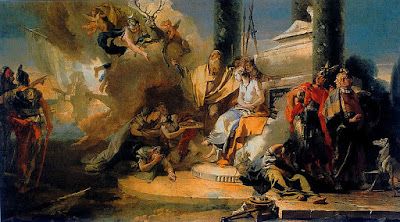 |
| The Sacrifice of Iphigenia (1770) Giovanni Battista Tiepolo source Wikimedia Commons |
Metamorphoses ~ Book XI
Book XI
Orpheus / The Bacchantes / Midas / Troy / Peleus & Thetis / Ceyx / Daedalion / The Wolf / Ceyx & Alcyone / Aesacus
Orpheus charms the beasts and trees with his songs, and even the stones pause to listen. But the Thracian women, the Bacchantes, are enraged, accusing Orpheus of scorning them. They hurl staffs and rocks at him, intent on murder but when a stone is flung,
Circling him, the women attack, and all of their weapons would have been tamed by his sweet music, if their “shrieks and caterwauls” had not drowned it out, and they murder and dismember him. Mournful sounds fill the air as his body is carried by the Hebrus river to the coast. There, a snake attempts to attack the head, but before it can, Phoebus turns it into stone. As the Shade of Orpheus descends to the Underworld, he meets Eurydice. Side by side, they walk and they can now gaze at each other without fear.
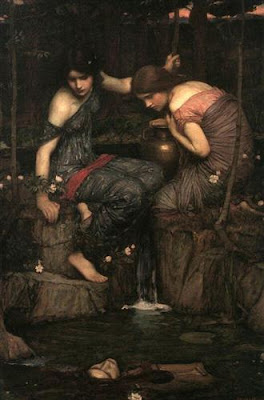 |
| Nymphs finding the head of Orpheus (1900) John William Waterhouse source Wikiart |
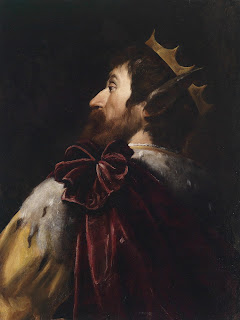 |
| König Midas (1670) Andrea Vaccaro source Wikimedia Commons |
 |
| Apollo and Poseidon Punishing Troy (c. 1590) Paolo Fiammingo source Wikimedia Commons |
 |
| The Feast of Peleus (1872-81) Edward Burne-Jones source Wikimedia Commons |
Ceyx tells of his brother, Daedalion, who had a lovely fourteen-year-old daughter, Chione. She was raped by both Phoebus and Mercury, bearing twin sons but one from each god: Autolycus, “a connoisseur of wiles and guiles”, and Phillamon, Apollo’s son, “famed for lyre and song.” Chione, because of this glory bestowed on her, now considered herself surpassing Diana’s beauty, and, for her insult, she was killed by an arrow of the goddess. At her funeral (burning), Daedalion overcome with grief, ran senselessly around, finally leaping from Parnassus’ peak, where Apollo changed him into a hawk, and “aggrieved, he makes all others mourn.”
As Ceyx relates this story, Peleus’ Phocian cowherd rushes in to announce that a wolf is ravaging the herds of oxen and terrifying the people. Peleus silently believes this event to be his penance for his crime. As they prepare to leave to deal with the wolf, Alcyone, the wife of Ceyx, begs him not to go, foreseeing his death. Thetis intervenes to pardon Peleus and helps him, changing the wolf into a marble statue. But the fates cause Peleus to travel to the land of Magnesia and King Acastus, where he is cleansed of his guilt.
Meanwhile Ceyx is still puzzled by his brother’s fate and these strange happenings, so he decides to consult an oracle on the isle of Clarus. Alcyone begs him not to go, but, while trying to calm her fears, he departs and his boat encounters a momentous storm. Before he drowns, he prays that his body will return to his wife for burial, and she finally spots it floating in the water, confirmation of her husband’s death that she had received in a dream conducted by Morpheus. As she tries to reach the body, she is changed into a bird (a kingfisher), and when she tries to cover her husband with her wings, he too changes:
 |
| Halcyone seeking her husband Ceyx (1914) Herbert James Draper source Wikimedia Commons |
An old man, as he watches the pair of birds, is reminded of another bird, a swift merganser. The bird is of the line of Ilus and Assaracus, then Ganymede, then Laomedeon, and finally Priam, who was the last king of Troy. Aesacus, half-brother of Hector (son of Priam) pursued the nymph, Hesperie, who was bitten by a serpent as she fled. Distraught, Aesacus offered his life for hers. As he leapt into the sea, Thetis pitied him and clothed him in feathers, but Aesacus so diligently sought death, he continually attempts to plunge in the sea, only to rise again. He is the diving bird, the merganser.
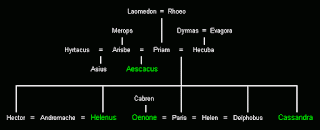 |
| source |
In this book, I noticed varying motifs on music, sound and hearing. Orpheus communicates by music, yet is drowned out by the Bacchantes’ shrieks; Apollo and Pan have a musical contest; Mt Tmolus must brush away the forest to hear; Midas for hearing ‘incorrectly’ has his ears changed to those of an ass; Proteus’ words are stopped/finished as he sinks into the sea; on Ceyx’s ship, the captain’s voice in drowned out by the “blustering winds”; Ceyx’s words are impeded by the waves; and the Cimmerian cave is a place of complete silence yet for the Lethe.
While the stories often seem random, we can experience a non-linear telling of some of the history of Troy and its heroes. The scattering make up a puzzle, if we can only pick up the pieces and fit them into the whole.
Metamorphoses
Snake ❥ stone
Thracian women ❥ oak trees
Midas’ touch ❥ gold
Midas’ ears ❥ ears of an ass
Thetis ❥ bird/tree/spotted tigress
Thetis ❥ various shapes ❥ Thetis
Daedalion ❥ hawk
Wolf ❥ marble statue
Ceyx & Alcyone ❥ birds (kingfishers)
Aesacus ❥ merganser (“diving bird”)
Metamorphoses ~ Book X
Book X
Orpheus and Eurydice / Cyparissus / Orpheus’ Prologue / Ganymede / Hyacinthus / The Cerastes / The Propoetides / Pygmalion / Myrrha & Cinyras / The Birth of Adonis / Venus and Adonis / Atalanta & Hippomenes / The Fate of Adonis
 |
| Orpheus & Eurydice (1864) Frederic Leighton source Wikiart |
Hymen did not bless the wedding of Orpheus, and what a mess! (I’m losing my narrative tone, aren’t I?) His bride, Eurydice, while crossing the meadow with her Naiad friends, stepped on a viper and died. After his weeping ceased, he travelled to the Underworld to seek his cherished wife. Playing sweetly on his lyre, he begged the gods to restore her to life, and so beautiful his song that even the bloodless shades shed tears and the Furies wept. By his skill and love, Orpheus won his wife back, but was warned as he was leading her out, to only look straight ahead or she would be reclaimed by the dead. Nearly in the upper world, Orpheus could not resist looking at her, and as his eyes fell upon her, he watched her sink back into the abyss. Frantic, he ranged the banks of the Styx like a shade, then finally left the Underworld.
Continue reading
Metamorphoses ~ Book IX
Book IX
Achelous & Hercules / Hercules, Deianira, Nessus / Hercules & Deianira / Alcmena / Dryope / Iolaus / Byblis & Caunus / Iphis & Ianthe
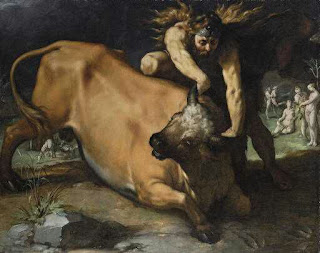 |
| Hercules and Achelous Cornelius van Haarlem source Wikimedia Commons |
Achelous relates how he lost his horn in a fight with Hercules when they both contended for the hand of Deianira. First he had attempted to persuade the girl’s father by disparaging Hercules, but Hercules discounted words, instead wanting to fight. Finally overpowered, Achelous first attempted to transform himself into a snake and then a bull, but his enemy tore off his horn, which the Naiads took and filled with fruit and flowers, now called a sacred Cornucopia. Sophocles’ play, The Women on Trachis, recalls this battle between Achelous and Hercules.
While Hercules was journeying back to Tiryns with his bride, Deianira, a rushing river stopped their path. Nessus, a centaur, offered to take the lovely bride safely to the other shore, while Hercules swam over. Once on the other side, Hercules hears cries and sees that the centaur is attempting to kidnap the girl. Yelling threats, he threaded his bow and shot the arrow which hit the centaur in the spine coming out on the other side. Knowing that Hercules had dipped the arrow in the venom of the Hydra, as life ebbed from him, Nessus gave his envenomed, blood-soaked tunic to Deianira, promising that it would kindle the love of Hercules.
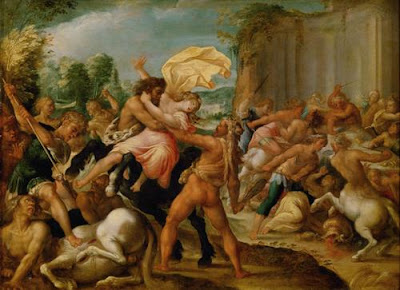 |
| Nessus kidnaps Deianeira (c. 1600) Hans Rottenhammer source Wikimedia Commons |
Juno hated Hercules for his mighty deeds and while he was away, she had Rumor go to his loving wife, whispering lies of his love of Iole. Deianira, being a sister of Meleager (I thought they were all turned into guinea hens – see Book VIII), devises a plan of revenge: to cut the throat of her rival, but meanwhile, she will send Hercules the tunic of Nessus to rekindle his love. As he wears it, the venom courses through Hercules’ body, bringing searing pain, but when he tries to take it off, he tears his flesh with it. Before he perishes in agony, he hurls his attendant, Lichas, into the sea, blaming him for bringing the gift and the man becomes a stone in the Euboean Sea. The gods are dismayed at what will happen to the earth’s defender and Jove decides to deify him, riding down in his chariot to cloak him in a cloud and then place him in the sky.
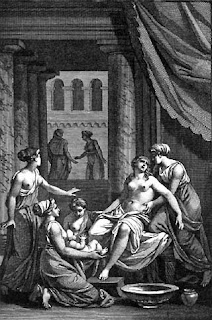 |
| Birth of Heracles Jean Jacques François de Barbier source Wikipedia |
Because of his father’s wishes, Hyllus, the son of Hercules, wed Iole who is now pregnant. Hercules’ mother, Alcmena gives the girl advice and tells her of her own birth pangs. Cruel Juno, angry at Jove’s impregnating Alcmena, sits outside, crosses her legs and her fingers to block the birth. But Galanthis, the servant girl, cleverly recognizes the goddess and announces that Alcmena has given birth. Juno is astounded, leap up and with the unlinking of her knees and fingers, the knot was undone and Alcmena finally gave birth. Yet Galanthis makes the mistake of jeering at Juno who turns her into a weasel.
Iole tells of her half-sister, Dryope, who was raped by Delphi’s deity (Phoebus), nevertheless Andraemon happily married her. One day, as she was walking with her infant son and Iole, she picked the purple blossoms of a lotus, which dripped blood with her plucking. The lotus was a nymph who had transformed herself after being chased by Priapus, but from Dryope’s innocent carnage, the lotus begins to transform her as well. Sister, husband and father, all rush to the scene just in time to hear Dryope’s final plea for her son to visit and know her, then she gives the boy a final kiss before her lips are sealed forever.
Iolaus appears in the doorway, this nephew of Hercules having his youth restored by his uncle’s request to Hebe, the wife he married when he was placed in the sky. Hebe wishes never to perform the task again, but her vow is stopped by Themis, the prophetess, telling of many times this similar event would take place in different ways. Even the gods wish for such favours for their favourites but through examples of Minos, Rhadamanthus and Aeacus, Jove demonstrates all are not so blessed and the deities settle down.
Old Minos is concerned about an overthrow by young Miletus, but Miletus sails away and starts his own city at the mouth of the Meander. He finds a Cyanee, is lured by her body and she gives birth to twins, Byblis and Caunus. Byblis develops an unsisterly love for Caunus, pining for him with a startling intensity. Finally, she sends him a letter confessing her love, which he receives with a burgeoning rage. He escapes, leaving the land and her obscene love, but she follows him in a frenzy of passionate despair, travelling all over until completely insane, she collapses, her tears transforming her into a fountain.
 |
| Byblis turning into a spring (1866) Jean-Jacques Henner source Wikimedia Commons |
In Phaestus, Crete, there lived a freeborn man called Ligdus with a pregnant wife, Telethusa. He wishes only two things for his “dear” wife (please, sense the beginning of sarcasm here): that she suffers little pain in childbirth and that the child may be a boy, because if it turns out to be a girl, he will put her to death. Both distraught over his decision, as Telethusa is about to give birth she sees the (Egyptian) gods, Anubis, Bubastis, Apis, Osiris’ son, Isis, Osiris, and the Egyptian snake who tell her to let the child live. So Telethusa is able to fool everyone into thinking that the child is a boy, and thirteen years later the boy, Iphis (really a girl), is betrothed to the lovely Ianthe. Now Iphis actually longs for Ianthe, but is distraught over her sex, thinking that nothing can come of the union. The girl prays to Isis, and behold! On the day of the marriage Iphis is transformed into a young man and gets his/her desire.
I must say that in spite of the distastefulness of some of these tales, Ovid has outdone himself. His metamorphoses are not just simply humans changing to bulls, birds and whatnot, but a broader transformation of gender, alliances, and even unnatural love.
Metamorphoses – Book VIII
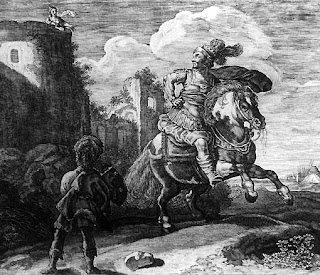 |
| Minos & Scylla 17th century etching source Wikimedia Commons |
 |
| The Minotaur (1884) George Frederick Watts source Wikimedia Commons |
 |
| Lament for Icarus (1897) Herbert James Draper source Wikimedia Commons |
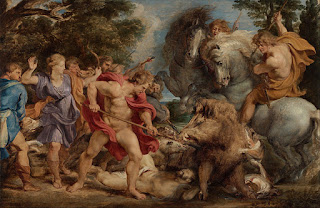 |
| The Calydonian Boar Hunt (1611-12) Peter Paul Reubens source Wikimedia Commons |
 |
| Mercury & Jupiter in the House of Philemon & Baucis (c. 17th century) Jacob an Oost source Wikimedia Commons |
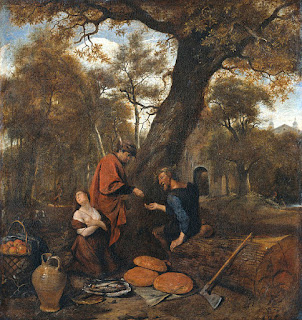 |
| Erysichthon Sells His Daughter (1650-60) Jan Havicksz Steen source Wikimedia Commons |
Five Naiads ❥ the Echinades islands
Metamorphoses Book VII
Book VII
Medea and Jason / Medea and Aeson / Medea and Pelias / The Flight of Medea / Theseus and Aegus / Minos / Cephalus / The Plague / The Myrmidons / Cephalus, Procris & Aurora
 |
| Jason and Medea (1907) John William Waterhouse source Wikiart |
The twin sons of Boreas assist King Phineus, who aids them in their journey to Colchis, where Jason meets with King Aeëtes to claim the Golden Fleece. The king agrees to relinquish his prize upon Jason completing three horrendous tasks. Yet Medea, daughter of the king, has fallen madly in love with Jason. In spite of Jason’s foreign origin and the loyalty she owes to her father, she agrees to help Jason succeed in his trials in exchange for his promise of marriage. First, he tames the dangerous bulls with herbs of Hecate given to him by Medea, yoking them to plow a field that has never before been plowed. As he drops snake’s teeth into the ground from a bronze helmet, each takes the shape of an armoured warrior who attacks Jason. But the young man hurls a stone into their ranks and they turn on each other, perishing in a civil war. In his last test, Jason puts to sleep a dragon with juices from a hypnagogic herb, gains the Fleece and sails home with his new wife.

